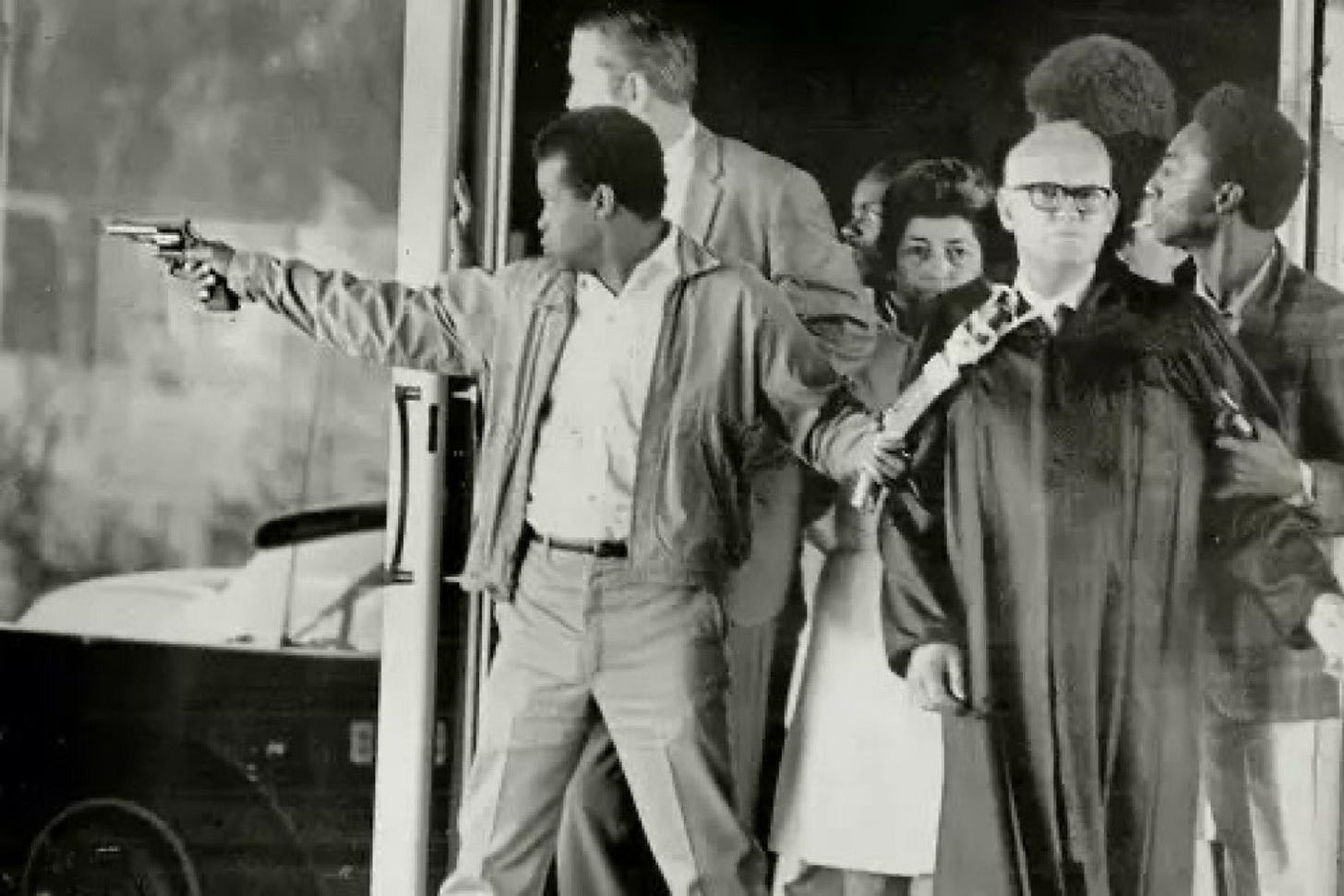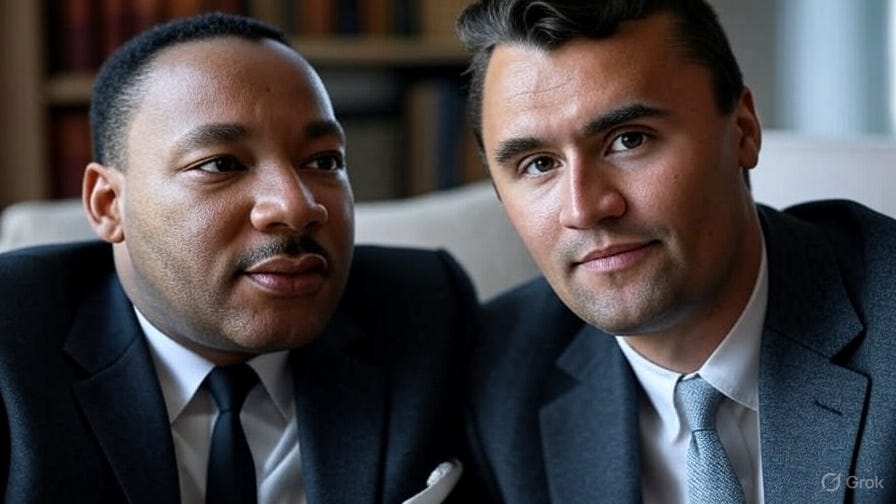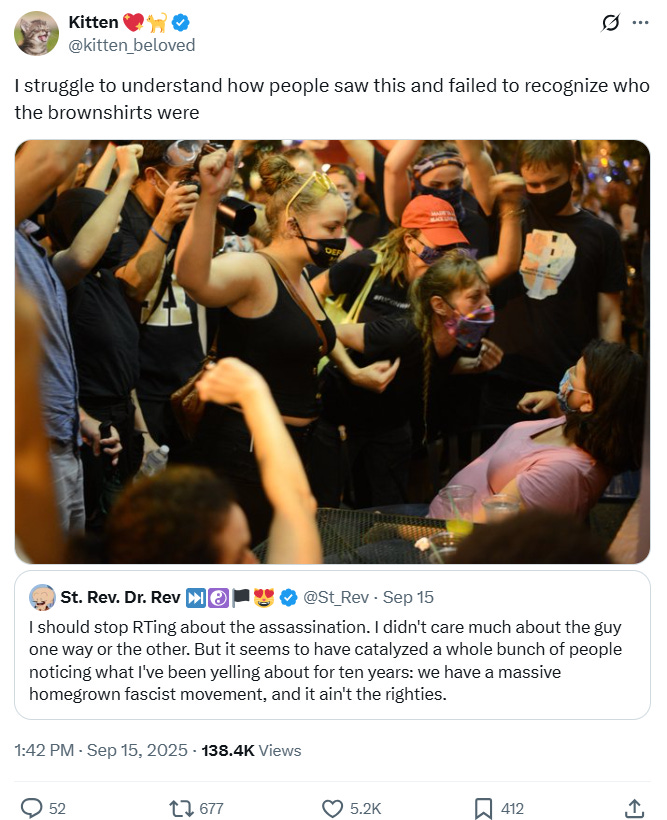What The Reactions To Charlie Kirk's Assassination Reveal
Our politics is conducted inside the left's moral framework.
The Left's Uncontested Moral Field
The reactions to Charlie Kirk’s assassination, and to the Zero Hedge version of my post about his killer’s antifascism, reveal a distortion in our politics. It wasn’t just that some on the left denied the obvious; it was that many on the right, in their condemnation, inadvertently revealed how thoroughly they have absorbed the left’s own moral framework.
Commenters argued that today’s militant antifascists are “the real fascists” because of their intolerance and use of violence.
This is a fundamental category error, but an understandable one. By exclusively anathematizing the far right after World War II, the Western establishment didn’t just condemn Nazism; it created a political universe with a permanent leftward tilt. The result is that even those who consider themselves conservative often find themselves fighting on a field designed by their opponents, using their opponent’s maps and their opponent’s definitions of good and evil.
The “Real Fascists” Trap
The claim that “antifa are the real fascists” is the most common example of this intellectual capture. It’s a concession that “fascist” is the ultimate political evil. The argument isn’t that the militant left’s tactics are inherently wrong; it’s that they accidentally resemble the tactics of the ultimate evil, and are therefore wrong by association. This completely accepts the left’s core moral premise: that the singular axis of political evil is defined by historical fascism. It cedes the moral high ground and fails to critique leftist authoritarianism on its own vile terms.
In reality, intolerance, violence, and a desire to silence opponents are not exclusive to fascism. They are the tools of totalitarianism, a category that comfortably encompasses the blood-soaked regimes of the communist left. But because communism was never subjected to the same cultural and moral purge as fascism, its tactics lack the same immediate, visceral stigma. A former terrorist like the Weather Underground’s Bill Ayers can be welcomed into academia, and Angela Davis—who provided the weapons used in a courtroom attack that left four people dead, including a judge—can be lauded as a civil rights icon and honored with a documentary narrated by Mumia Abu-Jamal.

It is unimaginable that a former right-wing terrorist with similar credentials would be afforded such respectability. The asymmetry is the point.
The Civil Rights Comparison
Another telling reaction was the instinct to canonize Charlie Kirk as a “civil rights leader” or compare his assassination to those of JFK, RFK, or MLK. A Republican congresswoman, for example, shared a meme making this exact comparison.
While well-intentioned, this is another form of accepting the left’s framing. It suggests that for a right-of-center figure to be worthy of mourning, he must be elevated to the left’s most sacred pantheon of martyrs. It implicitly agrees that the moral value of a political movement is measured by its proximity to the left’s own historical narratives. The right feels it must borrow the left’s moral language to legitimize its own grievances and its own victims.
The Cosmopolitan “Right”
This leftward tilt is the water in which our entire political fishbowl has swum for decades. The pre-Trump conservative ideal in America was Ronald Reagan—a man who voted for FDR four times. On foundational issues like mass immigration, the pre-Trump GOP establishment largely shared the Democratic consensus of ever-increasing flows. The boundaries of acceptable debate were set by the left, and the right merely argued over the technocratic details within those boundaries.
This is why the populist movements of the 21st century feel so disruptive. They are the first to fundamentally challenge the left-tilted field. Yet, even they often bear the marks of the system they rebel against. Donald Trump was a Democrat whose immigration policy would have fit comfortably in Bill Clinton’s administration. In Germany, the Alternative für Deutschland (AfD)—hysterically branded as “neo-Nazis” by the establishment—is led by Alice Weidel, an open lesbian gay married to a Sri Lankan woman.
She is not a blood-and-soil traditionalist; she is a cosmopolitan economic nationalist who believes the elite consensus has simply gone too far. Her very existence shatters the established narrative, proving that the rebellion against the leftist framework is not a return to a mythical past, but a correction of a present that has lost its way.
The Uncontested Frame
The reactions to the assassination of Charlie Kirk exposed a foundational reality of our politics. The “antifascist” brand is broken, but the left’s moral and rhetorical framework remains so dominant that it still dictates the terms of the right’s opposition.
The instinct to call leftist terrorists “the real fascists,” to legitimize a right-wing figure by comparing him to left-wing martyrs, and to rally behind leaders whose policies are mere variations of a 1990s Democratic consensus—these are not the actions of a movement operating with its own independent moral compass. They are the reflexes of a opposition that has been formed in the shadow of its opponent’s worldview.
This is the ultimate legacy of the post-WWII anathematization of the right. It wasn’t just that one ideology was condemned; it was that the other was allowed to define the boundaries of all subsequent debate. The result is a political landscape where even dissent must often be phrased as a form of flattery—a plea that “we are the true adherents to your virtues.”
A shock like the Kirk assassination makes this invisible framework briefly, starkly visible. It reveals a political arena where the rules are not neutral, the definitions are not shared, and the goal is not to win a debate but to finally realize you’ve been arguing on a tilted field your entire life. The first step in changing the game is to see the tilt.
Note to paid subscribers: We’ll be back to our regular programming later today, with a trade alert on one of our system’s top names.







If this is accurate, Americans are living through a dirty war on US soil: https://archive.org/details/route-91-uncovering-the-cover-up-of-the-vegas-mass-shooting.